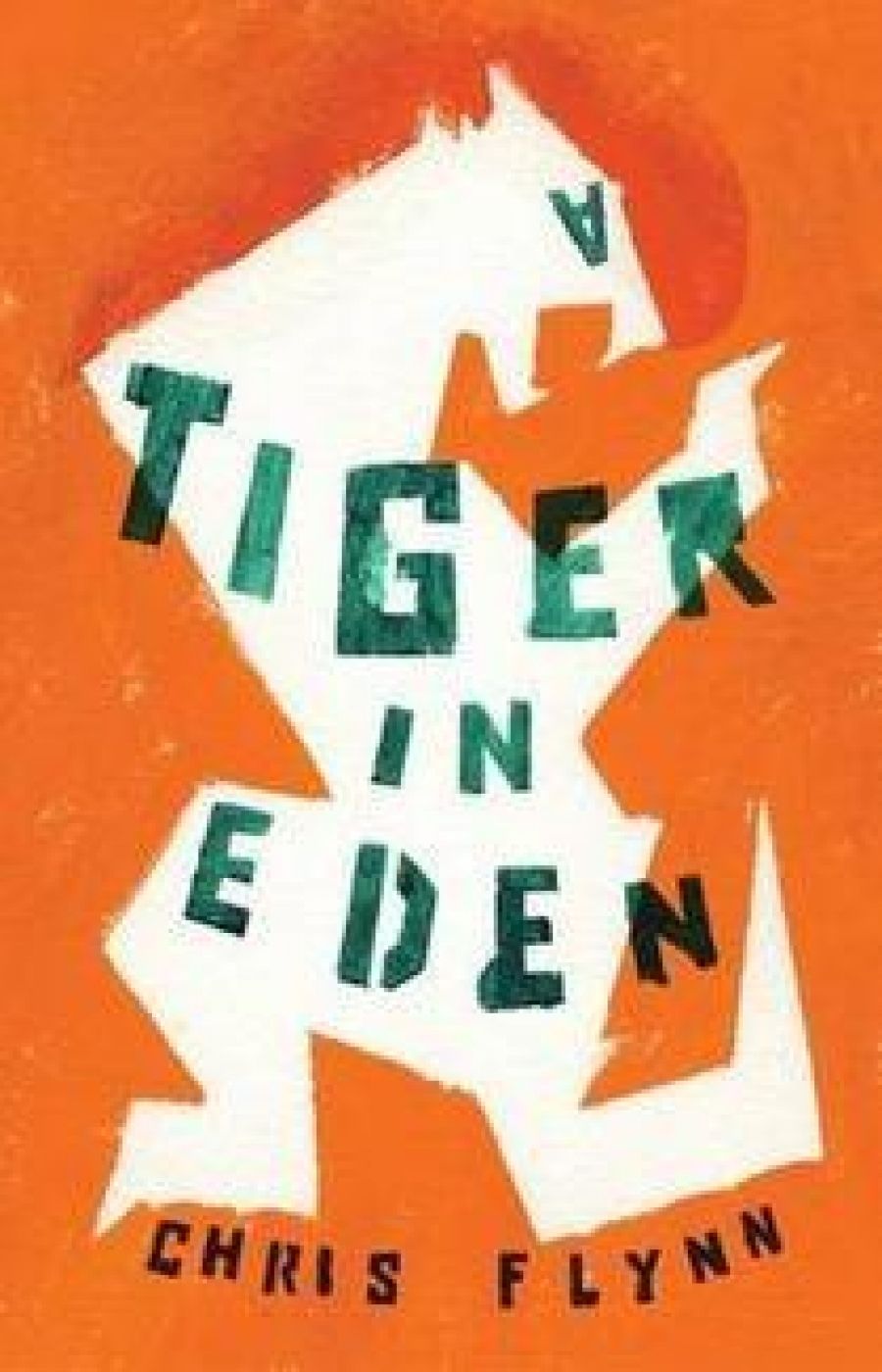
- Free Article: No
- Contents Category: Fiction
- Custom Article Title: Adam Rivett reviews 'A Tiger in Eden' by Chris Flynn
- Review Article: Yes
- Online Only: No
- Custom Highlight Text:
For ex-Orangeman Billy, history is a nightmare from which he’s trying to get a good night’s sleep. Haunted by ‘all the bloody faces of Catholic lads I done over and worse’, he’s an exile in Thailand, regularly numbing himself with cheap sex, beer, and the occasional fight. He claims he’s never seen the sunrise sober in his life. Things are about to change.
- Book 1 Title: A Tiger In Eden
- Book 1 Biblio: Text Publishing, $22.95 pb, 224 pp
A Tiger In Eden is Chris Flynn’s début novel, and a strong one. The next sentence is where your standard synopsis begins to play itself out, so let this reviewer state upfront one of his favourite things about the book: the lack of a plot. It is gratifying to read a book that does not bend at the knee to plot, does not assemble dull events in the hope of sustaining that forever wandering readerly attention. Don’t mistake those last two sentences for criticisms – not that there’s anything wrong with plotlessness, no matter what creative writing teachers say – but there is a fidelity Flynn has to voice and the slow accretion of human details that transcends the mere necessities of plot. Which is to say: style as voice. Never doubt the power of a gripping narrator.
Billy’s voice is laconic, self-aware, humble yet terse. He is aware of his limitations, for one, and slow to undercut his own sense of self. Flynn allows Billy a slowly expanding mind, a growing consciousness of all around him, that lets in both genuine change and the memories that are only hinted at early in the book. Initially his vocabulary is limited, his narration terse and jailed – things fall ‘like a ton of bricks’, etc. He makes obvious puns about ‘Phuket’. Colloquialisms abound: ‘Prod’ for Protestant, ‘Aul’ for Old, ‘peelers’ for police. Then there are his verbal tics, such as ending sentences with ‘so it is’ and ‘so it did’, like a kind of thug Vonnegut. This is meant to charm and beguile, but beneath the surface effects lies immense darkness.
So that plot then. Tiger’s first half offers a fair amount of Thai colour and sex and near violence, and some well-handled pub brawls and intimations of worse. However, things turn on Billy’s attendance at a Buddhist retreat, where two important things happen. First, he is denied speech for ten days. His mind wanders, taking some truly exuberant and rhapsodic flights of memory and empathy. Flynn’s prose here is particularly vivid, without ever descending into meaningless torsion of purple style. The second is even more important: he espies the lovely Lana, who has a large part to play in his life.
Flynn teases with the shape of conventional plotting, often to subsequently refute it outright. With this setup (haunted dreams, man on the run) a more conventional writer would take us where we have been before. Flynn, instead, wanders somewhere else. There are allusions to that other seminal piece of lost-in-the-worldism, Alex Garland’s The Beach (1996), and numerous digs at backpackers who are over-reliant on guidebooks and looking for something new. But instead of heavenly retreats, the belief that there is still somewhere ‘out there’ to find, and the desire to redeem the familiar lineaments of travel, Tiger turns toward the other possibility, and goes inward. Publishing hype is selling the book in ‘the anti-tradition of The Beach’, but it is really, if anything, an anti-Beach. It is better than that. After the pleasure-without-pleasure of the hedonist tourist, the novel chances its hand on something almost sentimental: forgiveness, peace.
Attaining either isn’t easy, in or out of a Buddhist retreat. As Billy’s past returns piece by piece in carefully deployed narrative slivers, Ireland’s violent history is called to account. Flynn wisely avoids extended commentary on ‘the Troubles’ – there is no lecturing, no inserted history lesson, no sociopolitical background or eye-for-eye back-story. It is a particular case, a particular character. This is not a political novel, but nonetheless one full of despair. Flynn’s eye for violence and danger is keen, and manifests itself skilfully in both the flashbacks to Billy’s past, and to the present alcohol-soaked moments of intoxicated swagger. Though often eliding the obvious on a scene-by-scene basis, the novel maintains a mood of constant tension, and heightened awareness.
Having mentioned these turbulences, it would be unfair not to mention the novel’s lighter moments. Tiger is frequently a very funny book, particularly in its use of 1990s references (again, a Beach callback). For example, one of the book’s funniest jokes name-checks dopey DJ megastar Paul Oakenfold in a truly preposterous yet oddly touching way. It is a convincingly lived-in world that Flynn has built around Billy – sweaty, confused, casual, listless, well detailed.
For all the book’s unresolved (and unresolvable) torment about Ireland, it is a quick and engaging read, with an oddly tender streak that, finally, works. Again, it is the voice that sells it. Flynn’s touch is nearly always light, but he is nonetheless able to smuggle in seriousness, and get away with it. As sentimental as it sounds, the book begins to hover around a simple but crucial question: is change possible? Billy’s attention, at the beginning of the book a little self-centred and sharp, begins to find definition and variation as his attentiveness to others increases. His language inflates, his eyes see more. His voice, crucially, expands.


Comments powered by CComment